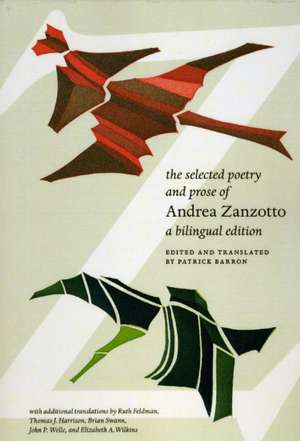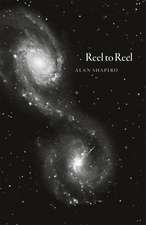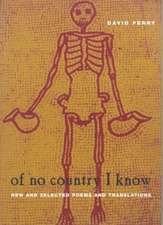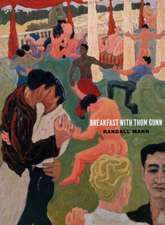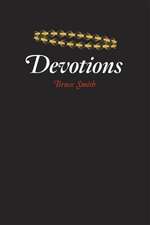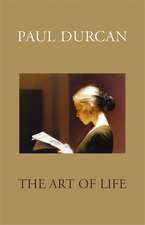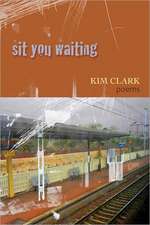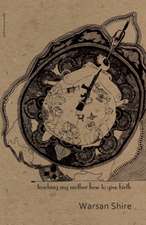The Selected Poetry and Prose of Andrea Zanzotto: A Bilingual Edition
Autor Andrea Zanzotto Traducere de Patrick Baron, Ruth Feldman, Thomas Harrison, Brian Swann, John P. Welle, Elizabeth A. Wilkinsen Limba Engleză Paperback – 16 mar 2009
Andrea Zanzotto is widely considered Italy’s most influential living poet. The first comprehensive collection in thirty years to translate this master European poet for an English-speaking audience, The Selected Poetry and Prose of Andrea Zanzotto includes the very best poems from fourteen of his major books of verse and a selection of thirteen essays that helps illuminate themes in his poetry as well as elucidate key theoretical underpinnings of his thought. Assembled with the collaboration of Zanzotto himself and featuring a critical introduction, thorough annotations, and a generous selection of photographs and art, this volume brings an Italian master to vivid life for American readers.
“Now, in [this book], American readers can get a just sense of [Zanzotto’s] true range and extraordinary originality.”—Eric Ormsby, New York Sun
“What I love here is the sense of a voice directly speaking. Throughout these translations, indeed from early to late, the great achievement seems to be the way they achieve a sense of urgent address.”—Eamon Grennan, American Poet
“Now, in [this book], American readers can get a just sense of [Zanzotto’s] true range and extraordinary originality.”—Eric Ormsby, New York Sun
“What I love here is the sense of a voice directly speaking. Throughout these translations, indeed from early to late, the great achievement seems to be the way they achieve a sense of urgent address.”—Eamon Grennan, American Poet
| Toate formatele și edițiile | Preț | Express |
|---|---|---|
| Paperback (1) | 305.73 lei 6-8 săpt. | |
| University of Chicago Press – 16 mar 2009 | 305.73 lei 6-8 săpt. | |
| Hardback (1) | 454.07 lei 6-8 săpt. | |
| University of Chicago Press – 12 apr 2007 | 454.07 lei 6-8 săpt. |
Preț: 305.73 lei
Nou
Puncte Express: 459
Preț estimativ în valută:
58.50€ • 61.08$ • 48.42£
58.50€ • 61.08$ • 48.42£
Carte tipărită la comandă
Livrare economică 05-19 aprilie
Preluare comenzi: 021 569.72.76
Specificații
ISBN-13: 9780226978857
ISBN-10: 0226978850
Pagini: 482
Ilustrații: 12 halftones, 41 line drawings
Dimensiuni: 152 x 229 x 33 mm
Greutate: 0.77 kg
Editura: University of Chicago Press
Colecția University of Chicago Press
ISBN-10: 0226978850
Pagini: 482
Ilustrații: 12 halftones, 41 line drawings
Dimensiuni: 152 x 229 x 33 mm
Greutate: 0.77 kg
Editura: University of Chicago Press
Colecția University of Chicago Press
Notă biografică
Patrick Barron is assistant professor of English at the University of Massachusetts–Boston. He is the recipient of a Fulbright Award, the Rome Prize, and a grant from the National Endowment for the Arts for the translation of the poetry of Andrea Zanzotto.
Cuprins
List of Illustrations
Translator’s Note and Acknowledgments
Introduction
Selected Poetry
da A che valse? Versi, 1938–1942 / from What was the point? Verse, 1938–1942 (1970)
“Nell’era della silenziosa pace” / “In the age of silent peace”
“Nei giorni delle insonni primavere” / “In the days of sleepless springs”
“A questo ponte” / “At this bridge”
da Dietro il paesaggio / Behind the Landscape (1951)
Indizi e Luna / Indications and Moon
Quanto a lungo / How Long
Ormai / By Now
Là sovente nell’alba / There Often in the Dawn
Serica / Silky
Distanza / Distance
Adunata / Gathering
Nel mio paese / In My Land
L’acqua di Dolle / The Water of Dolle
L’amore infermo del giorno / The Infirm Love of Day
Là sul ponte / There on the Bridge
Perché siamo / Because We Are
Dietro il paesaggio / Behind the Landscape
Nella valle / In the Valley
da Elegia e altri versi / from Elegy and Other Poems (1954)
Partenza per il Vaud / Departure for Vaud
Da Ore calanti / From Waning Hours
da Vocativo / from Vocative (1957)
Fiume all’alba / River at Dawn
Caso vocativo / Vocative Case
Colloquio / Colloquy
I paesaggi primi / The First Landscapes
Da un’altezza nuova / From a New Height
Esistere psichicamente / Existing Psychically
Impossibilità della parola / Impossibility of the Word
Prima del sole / Before the Sun
Dal cielo / From the Sky
da IX Ecloghe / from IX Eclogues (1962)
Un libro di Ecloghe / A Book of Eclogues
Ecloga I / Eclogue I
Ecloga II / Eclogue II
Ecloga III / Eclogue III
Per la finestra nuova / Through the New Window
Ecloga IV / Eclogue IV
La quercia sradicata dal vento / The Oak Uprooted by the Wind
Così siamo / That’s How We Are
Notificazione di presenza sui Colli Euganei / Notifying One’s Presence in the Euganean Hills
Epilogo: Appunti per un’Ecloga / Epilogue: Notes for an Eclogue
da La Beltà / from Beauty (1968)
La perfezione della neve / The Perfection of the Snow
Sì, ancora la neve / Yes, the Snow Again
Alla stagione / To the Season
Da Possibili prefazi o riprese o conclusioni / From Possible Prefaces or Resumptions or Conclusions
Al mondo / To the World
L’elegia in petèl / The Elegy in Petèl
Da Profezie o memorie o giornali murali / From Prophecies or Memories or Bulletin Boards
da Gli Squardi i Fatti e Senhal / from Glances, Facts and Senhals (1969)
From Glances, Facts and Senhals / Da Gli Squardi i Fatti e Senhal
da Pasque / from Easters (1973)
Da Misteri della pedagogia / From Mysteries of Pedagogy
La Pace di Oliva / The Peace of Oliva
Subnarcosi / Subnarcosis
Per lumina, per limina / By Lights, by Limits
Lanternina cieca / Small Dark Lantern
Codicillo / Codicil /
Translator’s Note and Acknowledgments
Introduction
Selected Poetry
da A che valse? Versi, 1938–1942 / from What was the point? Verse, 1938–1942 (1970)
“Nell’era della silenziosa pace” / “In the age of silent peace”
“Nei giorni delle insonni primavere” / “In the days of sleepless springs”
“A questo ponte” / “At this bridge”
da Dietro il paesaggio / Behind the Landscape (1951)
Indizi e Luna / Indications and Moon
Quanto a lungo / How Long
Ormai / By Now
Là sovente nell’alba / There Often in the Dawn
Serica / Silky
Distanza / Distance
Adunata / Gathering
Nel mio paese / In My Land
L’acqua di Dolle / The Water of Dolle
L’amore infermo del giorno / The Infirm Love of Day
Là sul ponte / There on the Bridge
Perché siamo / Because We Are
Dietro il paesaggio / Behind the Landscape
Nella valle / In the Valley
da Elegia e altri versi / from Elegy and Other Poems (1954)
Partenza per il Vaud / Departure for Vaud
Da Ore calanti / From Waning Hours
da Vocativo / from Vocative (1957)
Fiume all’alba / River at Dawn
Caso vocativo / Vocative Case
Colloquio / Colloquy
I paesaggi primi / The First Landscapes
Da un’altezza nuova / From a New Height
Esistere psichicamente / Existing Psychically
Impossibilità della parola / Impossibility of the Word
Prima del sole / Before the Sun
Dal cielo / From the Sky
da IX Ecloghe / from IX Eclogues (1962)
Un libro di Ecloghe / A Book of Eclogues
Ecloga I / Eclogue I
Ecloga II / Eclogue II
Ecloga III / Eclogue III
Per la finestra nuova / Through the New Window
Ecloga IV / Eclogue IV
La quercia sradicata dal vento / The Oak Uprooted by the Wind
Così siamo / That’s How We Are
Notificazione di presenza sui Colli Euganei / Notifying One’s Presence in the Euganean Hills
Epilogo: Appunti per un’Ecloga / Epilogue: Notes for an Eclogue
da La Beltà / from Beauty (1968)
La perfezione della neve / The Perfection of the Snow
Sì, ancora la neve / Yes, the Snow Again
Alla stagione / To the Season
Da Possibili prefazi o riprese o conclusioni / From Possible Prefaces or Resumptions or Conclusions
Al mondo / To the World
L’elegia in petèl / The Elegy in Petèl
Da Profezie o memorie o giornali murali / From Prophecies or Memories or Bulletin Boards
da Gli Squardi i Fatti e Senhal / from Glances, Facts and Senhals (1969)
From Glances, Facts and Senhals / Da Gli Squardi i Fatti e Senhal
da Pasque / from Easters (1973)
Da Misteri della pedagogia / From Mysteries of Pedagogy
La Pace di Oliva / The Peace of Oliva
Subnarcosi / Subnarcosis
Per lumina, per limina / By Lights, by Limits
Lanternina cieca / Small Dark Lantern
Codicillo / Codicil /
( a ( e / ( a ( e
da Filò. Per il Casanova di Fellini / from Peasants Wake for Fellini’s Casanova (1976)
Da Peasants Wake / From Filò
da Il Galateo in Bosco / from The Woodland Book of Manners (1978)
“Dolcezza. Carezza. Piccoli schiaffi in quiete.” / “Sweetness. Dearness. Little muffled slaps.”
Gnessulógo / Noplace
Diffrazioni, eritemi / Diffractions, Erythemas
(Certe forre circolari colme di piante . . .) / (Certain circular ravines brimming with plants . . .)
“Rivolgersi agli ossari. Non occorre biglietto.” / “Apply to the ossuaries. No ticket is needed.”
Stati maggiori contrapposti, loro piani / Conflicting Dominant States, Their Designs “Tentando e poi tagliuzzando a fette” / “Touching and then chopping into slices”
(Indizi di guerre civili) / (Indications of Civil Wars)
(Sono gli stessi) / (They’re the same)
From Da Ipersonetto / Hypersonnet
I – I – (Sonetto di grifi ife e fili) / (Sonnet of snouts hyphae and filaments)
III – III – (Sonetto di stragi e di belle maniere) / (Sonnet ofmassacres and good manners) /
IV – IV – (Sonetto del decremento e dell’alimento) / (Sonnet of decrement and nourishment)
(Che sotto l’alta guida) / (That under the noble guidance)
( ) ) ( / ( ) ) (
) ( ( ) / ) ( ( )
(Lattiginoso) / (Milky)
da Fosfeni / from Phospenes (1983)
Come ultime cene / Like Last Suppers
“Amori impossibili come” / “Loves impossible as”
Da Silicio, carbonio, castellieri / From Silicon, Carbon, Fortified Villages
Squadrare il foglio / Squaring the sheet
(Da Ghène) / (At Ghène’s)
“Ben disposti silenzi” / “Well disposed silences”
Da Periscopi / From Periscopes
Soprammobili e gel / Trinkets and Gel
(Anticicloni, inverni) / (Anticyclones, Winters)
Vocabilità, fotoni/ Vocability, photons
Da Tavoli, giornali, alba pratalia / From Tables, Newspapers, Snow-Covered Fields
Futuri semplici—o anteriori? / Futures—Simple or Anterior?
da Idioma / From Idiom (1986)
Genti / Peoples
Sfere / Spheres
Orizzonti / Horizons
“Pericolose—un giorno—bellezze” / “Dangerous—once—splendors”
Nino negli anni Ottanta / Nino in the Eighties
Da Andar a cucire / From Going Out to Sew
Par i otanta ani de Montale / Fio Montale on His Eightieth Birthday
In ricordo de Pasolini / In Memory of Pasolini
Da Mistieròi / From Small and Humble Occupations
Alto, altro linguaggio, fuori idioma? / High, Other Language, Beyond Idiom?
“Il cielo è limpido sino ad” / “The sky is transparent until”
Docile, riluttante / Docile, reluctant
da Meteo / From Meteo (1996)
Live / Live
Morèr Sachèr / Morèr Sachèr
Lanugini / Lanugos
“Non si sa quanto verde” / “There is no telling how much green”
Leggende / Leggends
Stagione delle piogge / Season of the Rains
Tu sai che / You know that
Altri papaveri / Other Poppies
Currunt / Currunt
Colle, ala / Hill, wing
“E ti protendi come silenzio” / “And you lean out like silence”
Topinambùr / Topinambùr
Altri topinambùr / Other
da Filò. Per il Casanova di Fellini / from Peasants Wake for Fellini’s Casanova (1976)
Da Peasants Wake / From Filò
da Il Galateo in Bosco / from The Woodland Book of Manners (1978)
“Dolcezza. Carezza. Piccoli schiaffi in quiete.” / “Sweetness. Dearness. Little muffled slaps.”
Gnessulógo / Noplace
Diffrazioni, eritemi / Diffractions, Erythemas
(Certe forre circolari colme di piante . . .) / (Certain circular ravines brimming with plants . . .)
“Rivolgersi agli ossari. Non occorre biglietto.” / “Apply to the ossuaries. No ticket is needed.”
Stati maggiori contrapposti, loro piani / Conflicting Dominant States, Their Designs “Tentando e poi tagliuzzando a fette” / “Touching and then chopping into slices”
(Indizi di guerre civili) / (Indications of Civil Wars)
(Sono gli stessi) / (They’re the same)
From Da Ipersonetto / Hypersonnet
I – I – (Sonetto di grifi ife e fili) / (Sonnet of snouts hyphae and filaments)
III – III – (Sonetto di stragi e di belle maniere) / (Sonnet ofmassacres and good manners) /
IV – IV – (Sonetto del decremento e dell’alimento) / (Sonnet of decrement and nourishment)
(Che sotto l’alta guida) / (That under the noble guidance)
( ) ) ( / ( ) ) (
) ( ( ) / ) ( ( )
(Lattiginoso) / (Milky)
da Fosfeni / from Phospenes (1983)
Come ultime cene / Like Last Suppers
“Amori impossibili come” / “Loves impossible as”
Da Silicio, carbonio, castellieri / From Silicon, Carbon, Fortified Villages
Squadrare il foglio / Squaring the sheet
(Da Ghène) / (At Ghène’s)
“Ben disposti silenzi” / “Well disposed silences”
Da Periscopi / From Periscopes
Soprammobili e gel / Trinkets and Gel
(Anticicloni, inverni) / (Anticyclones, Winters)
Vocabilità, fotoni/ Vocability, photons
Da Tavoli, giornali, alba pratalia / From Tables, Newspapers, Snow-Covered Fields
Futuri semplici—o anteriori? / Futures—Simple or Anterior?
da Idioma / From Idiom (1986)
Genti / Peoples
Sfere / Spheres
Orizzonti / Horizons
“Pericolose—un giorno—bellezze” / “Dangerous—once—splendors”
Nino negli anni Ottanta / Nino in the Eighties
Da Andar a cucire / From Going Out to Sew
Par i otanta ani de Montale / Fio Montale on His Eightieth Birthday
In ricordo de Pasolini / In Memory of Pasolini
Da Mistieròi / From Small and Humble Occupations
Alto, altro linguaggio, fuori idioma? / High, Other Language, Beyond Idiom?
“Il cielo è limpido sino ad” / “The sky is transparent until”
Docile, riluttante / Docile, reluctant
da Meteo / From Meteo (1996)
Live / Live
Morèr Sachèr / Morèr Sachèr
Lanugini / Lanugos
“Non si sa quanto verde” / “There is no telling how much green”
Leggende / Leggends
Stagione delle piogge / Season of the Rains
Tu sai che / You know that
Altri papaveri / Other Poppies
Currunt / Currunt
Colle, ala / Hill, wing
“E ti protendi come silenzio” / “And you lean out like silence”
Topinambùr / Topinambùr
Altri topinambùr / Other
Recenzii
“Andrea Zanzotto is one of the world’s great nature poets, and this beautiful collection makes his poetry and prose amply available to English-speaking audiences for the first time. His work reveals the inextricable attachments between human experience and the physical world, attachments charged with extraordinary emotion.”
“Zanzotto emphasizes the importance of place while simultaneously stressing that even the smallest corner of the world is beyond our ultimate understanding. In his poetry there’s a line-by-line beauty and a fundamental humility that, when combined with his complex moral and philosophical vision, leave a reader with a stimulated and enriched heart and an agitated and excited mind.”
“The range of Andrea Zanzotto’s poetic achievements is stupendous—including his subtle and sustained dialogue with the landscapes of his native Veneto, his discerning appropriation of themes from Virgil and Dante, and his integration into verse of etymology, dialect, and drawing. Yet, throughout these diverse modes of writing, the imagery always remains vividly arresting, the voice authentic and engaging. Just as Stephen Mitchell’s renderings of Rilke and David Hinton’s of Wang Wei have done so much to enhance interest in those artists, these translations by Patrick Barron and his colleagues will make Zanzotto indispensable to English-speaking lovers of poetry.”—John Elder, Middlebury College
"Now, in The Selected Poetry and Prose of Andrea Zanzotto: A Bilingual Edition, American readers can get a just sense of [Zanzotto's ] true range and extraordinary originality. Mr. Barron has provided most of the translations, together with a perceptive introduction and a number of quite lovely illustrations (including several impish portraits of the poet himself), but he has also included translations by other hands, including the earlier versions by [Brian] Swann and [Ruth] Feldman."
Outstanding Academic Title, 2007, from Choice Magazine
“Given the importance of the chiseling of words operated by Zanzotto in all of his poetical works, the translations acquire utter importance, and they most often succeed
completely in rendering Zanzotto’s experimental wording in all of its muting and translucent opacity…. Showing an attention in the selection of Zanzotto’s works that goes beyond the desire to choose only the poet’s most representative texts and following, rather, a conceptual thread, Barron succeeds in giving us a volume in which the three ever-shifting elements that constitute the basis of Zanzotto’s poetry—landscape, language, and poetic subject—are showcased.”
completely in rendering Zanzotto’s experimental wording in all of its muting and translucent opacity…. Showing an attention in the selection of Zanzotto’s works that goes beyond the desire to choose only the poet’s most representative texts and following, rather, a conceptual thread, Barron succeeds in giving us a volume in which the three ever-shifting elements that constitute the basis of Zanzotto’s poetry—landscape, language, and poetic subject—are showcased.”
"Translations of [Zanzotto] have tended to be sporadic and difficult to come by. The University of Chicago Press has now produced lavish hardback anthologies...with generous portions, in English and Italian, of all of the manin collections of verse, plus (in English only) selections from their prose wiritings.... Zanzotto deserve[s] to be much better known outside Italy...the translations are always serviceable at at times of high quality."
"This massive, handsomely designed, and copiously illustrated volume is the best possible introduction to [Zanzotto's] work, giving as it does an excellent impression of the scale of his acheivement....Zanzotto is a major voice in world poetry, one that urgently needs to be heard in the current political and social climate (not the least for his profound and consistent engagement with ecological themes). This splendid volume makes that possible."
"Zanzotto is one of those rare poets who's grown wilder as he's gotten older; the poems of his old age are as strange and wacky as ever. . . . For six decades now he has been producing his astonishing verse."
"This inviting volume represents the most complete anthology to date of Zanzotto's work in English translation, including an ample selection of poems . . . and thirteen prose pieces that present some of the central ideas underpinning the creative project of an author considered to be one of the most original voices operating in Italy today."
